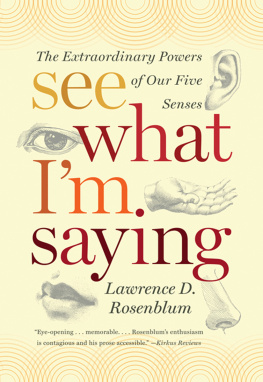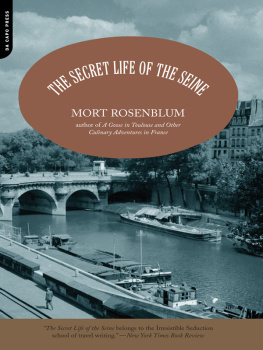Lawrence D. Rosenblum
W. W. N ORTON & C OMPANY
Copyright 2010 by Lawrence D. Rosenblum
Rosenblum, Lawrence D.
See what im saying: the extraordinary powers of our five senses / Lawrence D. Rosenblum.1st ed.
p. cm.
Includes bibliographical references.
1. Senses and sensation. I. Title.
W. W. Norton & Company, Inc.
500 Fifth Avenue, New York, N.Y. 10110
www.wwnorton.com
W. W. Norton & Company Ltd.
Castle House, 75/76 Wells Street, London W1T 3QT
Preface
W HAT ARE YOU PERCEIVING RIGHT NOW ? Y OUR EYES SEE THE words printed on this page. Your hands feel the textures of the paper and cover of this book. Your ears hear nearby and more distant sounds. Your nose might detect food or the laundry detergent on your shirt or the soap on your skin. Your tongue might taste the salt, sugar, or other remnants left over from your last meal. As you introspect further, youll notice less prominent things: the visual background adjacent to this book, the feeling of the clothes on your skin, the sound of your own breathing.
But at this very moment, you are accomplishing a number of perceptual feats that are more difficult to experienceand more difficult to believe. You are hearing things that dont make noise. You are feeling things that dont touch your skin. You are smelling things that have no discernible odor. You are seeing things that have no form. And, you do these things all the time. In fact, these exotic perceptual skills are critical to your connection to the world and to your survival.
These more exotic skills are all based on the physical information available to your senses along with the physiology that allows your senses to take in this information. These perceptual skills are not clairvoyance or mindreading, or supernatural in any way. They are real, replicable, and scientifically knowable.
New research in perceptual psychology and brain science is revealing that our senses pick up information about the world that we thought was only available to other species. But, as science is learning, we can use sound like bats, smells like dogs, and touch like bugs, and we do so constantly. As our more-conscious brains are busy with the trivialities of our day, our less-conscious brains are engaged in much more interesting endeavors. Our less-conscious brains are absorbing a profusion of sights, sounds, and smells using processes that seem superhuman. While psychologists have long known that our sensory systems can take in information without our awareness, new research is showing that entire perceptual skills are ocurring this way. These implicit perceptual abilities are allowing our less-conscious brains to have all the fun. A goal of this book is to bring some of that fun to our more-conscious selves.
To help you understand your sensory superpowers, this book introduces you to individuals with highly developed perceptual skills. You will meet a blind man who uses his inborn sonar system to lead mountain bike expeditions and others who use the sounds of a beeping baseball to hit and field with astonishing accuracy. Youll learn how an expert lip-reader is able to perceive speech as well as, and from a greater distance than, a hearing person, and how a deaf-blind individual can perceive speech by touching the face of a talker. Youll observe how wine connoisseurs taste the vintage of an obscure French wine, and how a fragrance designer can expertly match an aroma to the visible dcor and clientele of a hotel. Youll hear how a champion a cappella group maintains perfect pitch, and how a blind surveillance expert can recognize phone numbers by listening to the complex pitches produced by telephone touch tones. Youll learn how an expert fisherman can feel the type, sex, and age of a fish on his line, and how a professional food taster can discern how long it will be before a cookies ingredients will begin to turn. Importantly, these examples will not be used to argue that only some individuals are perceptually gifted but rather to highlight the potential of everyones perceptual powers. We all have an onboard sonar system and a type of absolute pitch; and we all can perceive speech from seeing and even touching faces. Whats more, we engage many of these skills all day long. What largely distinguishes the expert perceiver from the rest of us is the same thing that gets us from here to Carnegie Hall: practice. By understanding the expertise of others, youll get ideas on how to improve your own implicit perceptual abilities.
The new discoveries of perceptual superpowers are certainly exciting in their own right, but these discoveries are also scientifically important in revealing emerging principles of perceptual psychology and brain science. For example, recent evidence that sensory compensation occurs in not just sensory-impaired individuals, but in all of us, supports a growing conception of neural plasticity that is far-reaching. It turns out that we all have brain regions and cells that can change their function depending on our experiences. Furthermore, the growing evidence for our ability to use multiple senses for what until very recently were considered single-sense functions (perceiving speech from seeing faces; perceiving a persons attractiveness from smells ) supports the emerging notion that the brain is designed around multisensory input. In some ways, the brain doesnt much care which sense organ provides information. This fact is even true of the supposed visual and auditory brain centers that, we now know, incorporate multisensory input. Finally as youll discover, many of our implicit perceptual skills involve sensitivity and reactivity to human actions. Extraordinary sensitivity to what others are doing is consistent with evidence for brain cells that have the dual role of recognizing and producing an action (throwing, smiling). As we silently listen to speech, cells that are involved in initiating our speech movements are activated. These mirror systems may help explain our tendency to automatically mimic aspects of each others behaviors such as facial expressions and speech inflections. In sum, as you read about your implicit perceptual skills, youll also learn about the important new principles of perceptual and brain science that explain these skills.
So why havent you heard about these implicit perceptual skills before? And why can this book be written now? The answers lie with some recent advances in perceptual science.
It is a particularly good time to be a brain. Contemporary technologies for seeing the brain at work (functional magnetic resonance imaging, evoked potentials, magnetoencephalography, transcranial magnetic stimulation) have allowed for a number of critical discoveries about perception. For example, the technologies have revealed that in important ways, your brain knows more about the outside world than you do. New evidence suggests that your brain is constantly reacting to stimuli for which you have little conscious awareness. As an example, youll learn in Chapter 4 that your brain is activated by odors long after you have habituated to and no longer notice them. It turns out that much of what your nose does, it does unconsciously. The new research is also showing that your brain doesnt simply react to unconscious input, it uses this input in meaningful ways that bear on your judgments and behavior.












